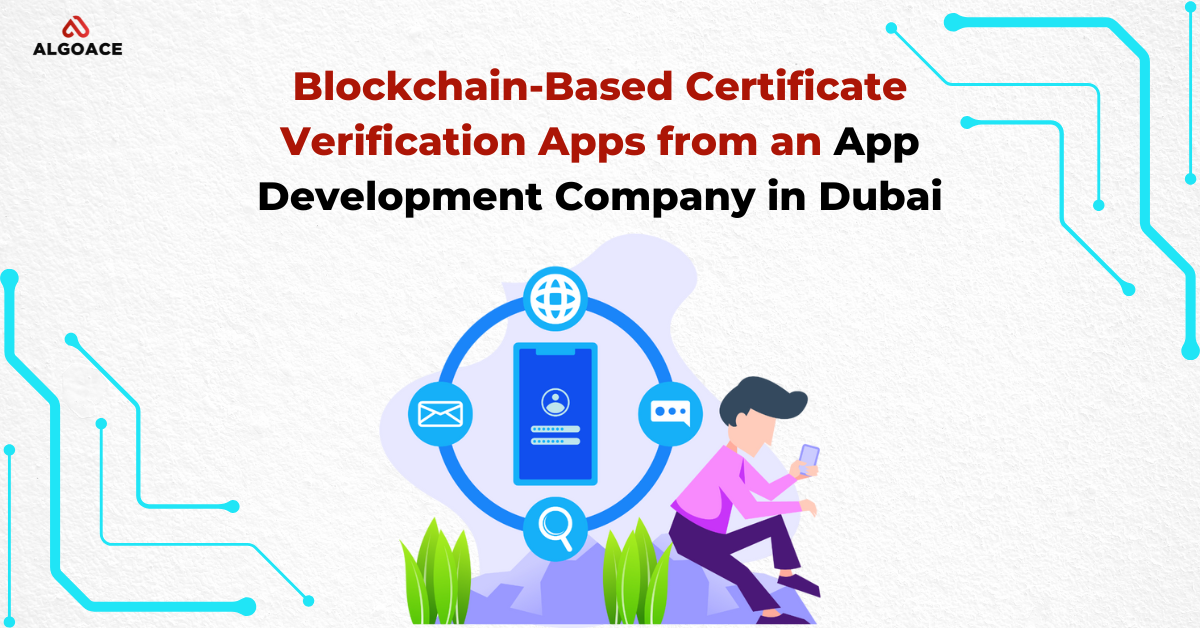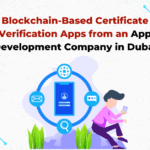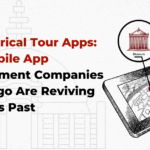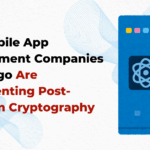
In a time where digital documents prevail and paper trails are diminishing, trust is also transitioning to the digital realm. From counterfeit degrees to altered training certificates, document fraud is a significant and escalating issue. However, there’s positive news — an app development company in Dubai is transforming the landscape by leveraging one of the most impactful technologies available today: blockchain.
This article explores how software development companies in Dubai are creating secure, transparent, and tamper-resistant applications for certificate verification that utilize blockchain technology. Let’s delve into how this digital transformation is influencing education, human resources, government sectors, and even personal branding.
The Problem: Fake Certificates Are Everywhere
Many employers would be astonished by the number of individuals deceived by fraudulent diplomas. From well-known universities to specialized certifications, fabricating a document is quite simple, while authenticating it remains challenging. Businesses, educational institutions, and even embassies can spend days — occasionally weeks — verifying the validity of a certificate.
Moreover, it’s not only the recruitment process that is affected. False credentials in fields like healthcare, law, or engineering can lead to serious repercussions. That’s why software development companies are stepping up to provide a more intelligent solution.
Why Blockchain Is Perfect for Certificate Verification
Blockchain is perfectly suited for the verification of certificates due to its exceptional transparency, security, and permanence. iOS app developers in Bahrain are leveraging this technology to create secure apps that make credential verification fast and tamper-proof. When a certificate is entered into the blockchain, it becomes resistant to tampering and can be verified instantly from any location across the globe.
Immutability, Transparency, and Trust
Blockchain is typically linked to Bitcoin, but its true power lies in its data management capabilities. Each entry in a blockchain is date-stamped, decentralized, and resistant to modification. This implies that once a certificate is recorded on the blockchain, it cannot be changed by anyone—not even the issuing body—without being noticed.
In essence, blockchain shifts trust from something we must verify into something we can confirm immediately.
This is where an app development company in Dubai is taking the lead.
How a Dubai-Based App Development Company Is Leading Innovation
A prominent app development company in Dubai is transforming digital trust by creating blockchain-based certificate verification applications. These groundbreaking solutions are enabling institutions, employers, and governments to securely and swiftly verify credentials.
Building Scalable Blockchain Platforms for Education and Government
Dubai has consistently established itself as an innovative technology center. By the UAE’s strategy for blockchain, an app development company in Dubai is developing applications that securely store academic, training, and professional credentials on the blockchain.
These applications are not merely experimental. They are being implemented across universities, corporate training facilities, and government programs for skill enhancement.
Key features of these apps include:
- Verification through QR codes
- Digital signatures stored on-chain
- Permission settings based on user roles
- Integration with national identification systems
- Interfaces available in multiple languages (English/Arabic)
How the Blockchain Certificate Verification App Works
The app for verifying blockchain certificates streamlines the authentication process by ensuring that credentials are immune to tampering and can be validated instantly. It eliminates the need for slow, manual verifications by utilizing real-time checks through decentralized technology.
Step-by-Step Process That Simplifies Authentication
Let’s examine how a conventional blockchain-based certificate verification application operates:
- Certificate Issuance: The educational institution provides a digital certificate and records its cryptographic hash on the blockchain.
- Recipient Obtains Certificate: The app delivers a copy of the certificate to the individual, along with a distinctive QR code.
- Third-Party Verification: Employers or institutions can either scan the QR code or input a certificate ID into the app. The blockchain promptly verifies its authenticity — no need for calls or emails.
- Lifetime Validation: As it is stored on the blockchain, the certificate remains forever accessible and does not expire or get lost unless revoked.
It’s that straightforward — instant validation, no paperwork involved.
Real-World Use Cases in Dubai and Beyond
Dubai is not merely testing blockchain certificate applications — it is actively implementing them across various sectors. The real-world utilization is already reshaping how credentials are issued and authenticated, from the education sector to government licensing — a transformation that even mobile app development companies in Chicago are closely watching and beginning to adopt in their localized solutions.
Universities, Employers, and Government Bodies Are Adopting It Fast
A growing number of industries in Dubai are adopting this technology quickly:
- Universities: Graduates receive a digital diploma that is recorded on a public or permissioned blockchain.
- Employers: Human Resources teams utilize the application to confirm academic and training credentials in a matter of seconds.
- Government Agencies: Professional licenses for healthcare professionals, engineers, and lawyers are being verified through blockchain technology.
This is not a concept of the future. It is occurring now, driven by software development companies advancing the field.
Benefits for Institutions, Employers, and Individuals
Applications for blockchain-based certificate verification are not just technological improvements — they foster trust. Regardless of being a university, a hiring manager, or a job applicant, the benefits are both immediate and enduring.
It’s a Win-Win for Everyone in the Ecosystem
For Institutions:
- Eliminate the need for printing or sending certificates via courier.
- Enable instant verification worldwide.
- Boost credibility and prestige.
For Employers:
- No requirement for background verification services.
- Immediate trust in educational and professional qualifications.
- Savings on costs and reduced human resource workload.
For Individuals:
- Easily share on LinkedIn or with prospective employers with one click.
- A digital wallet to store all credentials.
- Long-lasting trust and brand equity.
By selecting a reputable app development company in Dubai, institutions and businesses are investing in digital trust.
Integration with Other Emerging Technologies
Blockchain certificate verification applications are advancing beyond basic validation functions. By incorporating innovative technologies like AI, IoT, and AR, they are transforming into intelligent, adaptive, and future-oriented solutions.
Combining Blockchain with AI and IoT
The integration of Blockchain with AI and IoT is being explored by some of the most progressive software development companies.
- AI: To identify anomalies or fraudulent patterns in submitted certificates.
- IoT: To enable training centers to provide real-time attendance and performance data recorded on the blockchain.
- AR/VR: For generating virtual credentials following immersive learning experiences.
This level of innovation can only thrive in environments as dynamic as Dubai’s.
Compliance and Security: Built Into the App Design
When discussing digital credentials, security and privacy must be prioritized. The blockchain-based certificate applications developed by an app development company in Dubai focus on compliance and data protection from the ground up.
GDPR, UAE Data Laws, and End-to-End Encryption
Data privacy is a significant issue with any blockchain application. Fortunately, a Dubai app development company creates its platforms that meet the following standards:
- GDPR (EU)
- UAE Personal Data Protection Law
- ISO-certified security protocols
The app store only records hashes (not the actual documents) on the blockchain, ensuring that sensitive information remains confidential. Users have control over access, and each verification request is logged with transparency.
This level of design makes these applications resilient to future challenges and ready for regulatory compliance. It’s the type of innovation that flourishes within the adaptable environment of Dubai.
Challenges and How Developers in Dubai Are Overcoming Them
Blockchain-based verification of certificates is a powerful approach, but its implementation faces several obstacles. Developers in Dubai are addressing these challenges with intelligent, localized strategies.
From Adoption Resistance to Technical Hurdles
Every technology rollout encounters obstacles. Here are some issues that software development companies are actively working to resolve:
- Limited awareness: Certain institutions are reluctant to adopt due to insufficient technical understanding. Approach: Providing in-app tutorials, simplifying onboarding, and offering incentives from the government.
- Compatibility: Institutions do not all utilize the same certificate formats.
- Approach: Applications now accommodate standard formats such as OpenCerts and W3C Verifiable Credentials. Expense: Developing blockchain solutions can be costly.
- Approach: Numerous app development companies in Dubai now provide SaaS models for smaller businesses.
The Business Case: Why Dubai-Based Companies Are Investing Heavily
Companies in Dubai’s tech sector are not only embracing blockchain for innovative purposes but also identifying it as a lucrative business opportunity. The demand for certificate verification applications is soaring, particularly in education, human resources, and governmental areas.
Certificate Verification as a Service (CVaaS)
Applications based on blockchain technology for certificate verification are creating new business opportunities. App development company in Dubai are introducing CVaaS platforms that allow educational organizations or HR companies to utilize a blockchain infrastructure through a subscription model.
This approach generates continuous revenue for developers while reducing expenses for clients, creating a beneficial scenario for both parties.
What’s Next? The Future of Blockchain Credentialing in the GCC
As the trend of blockchain credentialing expands in Dubai, its effects are starting to influence verification practices throughout the GCC region. The upcoming phase of innovation is expected to bring about cross-border recognition, more sophisticated integrations, and broader acceptance by institutions.
Expansion, Interoperability, and Global Recognition
Dubai serves as just the initial step. As Gulf Cooperation Council (GCC) nations converge on technological strategies, we can expect to see:
- Regional registries for credentials
- Validation across borders (UAE-Saudi-Qatar)
- Integrations of blockchain-based digital identification
- Support for multiple languages within applications
With Dubai as the focal point of the region, a growing number of software development companies are emerging to deliver these advanced solutions.
Conclusion
Verification of certificates through blockchain technology is not merely a trendy innovation. It has become essential in our digital-first society. When aiming to develop trust-centered applications, there’s no better city to consider than Dubai.
If your business is exploring digital credentialing, partnering with a proficient app development company in Dubai could be the most strategic decision you make.






0 Comments